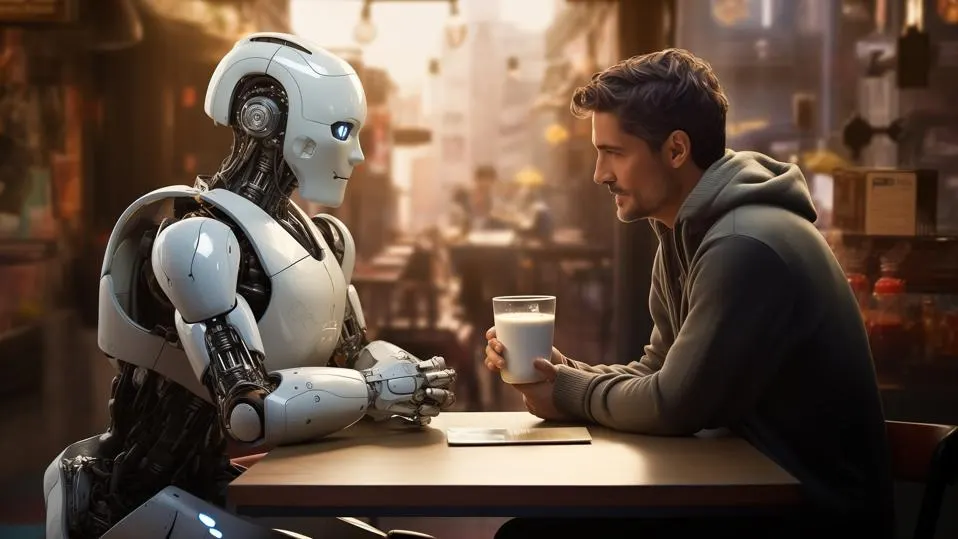Why AI Challenges Us To Become More Human
13 May 2024
In an era where artificial intelligence is reshaping the boundaries of what machines can do, we find ourselves at a pivotal moment in history. AI isn’t just a technological upgrade; it’s a mirror reflecting our potential to evolve as a species. As these intelligent systems take over routine and repetitive tasks, they challenge us to delve deeper into what makes us uniquely human: our creativity, empathy, and the ability to navigate complex social dynamics. Let’s explore why the rise of AI might actually be the best thing to push humanity towards realizing its full potential.

The Unfulfilled Potential Of Human Creativity
Every day, countless hours are spent on tasks that, frankly, do not require the distinct capabilities of the human brain. Data entry, managing bookings, and even diagnosing common medical conditions are just a few examples. These tasks, while important, are mechanical—often predictable and repetitive. It's in this mundane reality that AI steps in, not as a replacement for human effort but as a liberator of human potential.
Imagine a world where the bulk of such tasks is handled by AI. This isn't a distant future scenario; it's already happening. AI applications in business, healthcare, and even creative industries are taking over the drudgery, enabling us to focus on tasks that require a human touch—innovation, strategy, and personal interaction. This shift is monumental, akin to the Industrial Revolution, but instead of mechanical muscle, we're leveraging digital brains.
Creative Problem Solving With AI
The real magic happens when AI and human intelligence are combined to tackle complex problems. Consider the field of environmental science, where AI can analyze vast datasets of climate patterns far quicker than any human team. However, interpreting these patterns and strategizing impactful interventions require human ingenuity and ethical consideration—qualities that AI has yet to master.
Another compelling example is in artistic endeavors. AI can now compose music or generate graphic art, but it lacks the nuanced understanding of what captivates human emotions and cultural contexts. Artists collaborating with AI find that it can act as a powerful tool to extend their own creative capabilities, pushing the boundaries of traditional art forms into new and unexplored territories.
Human + AI Collaboration: A New Frontier
The synergy between human and machine opens up new frontiers for exploration and innovation. In healthcare, AI systems analyze medical data at superhuman speeds, but doctors provide the compassionate care and nuanced understanding that only a human can offer. Together, they achieve better outcomes, with AI handling data-driven tasks and humans focusing on patient care.
In business, AI tools predict consumer behavior through algorithms, but marketing professionals use these insights to craft creative and emotionally engaging campaigns that resonate on a human level. The technology identifies patterns, but the marketer tells the story.
The Future Is Human
As AI takes care of the ‘robotic’ aspects of work, humans are nudged towards roles that require creative problem-solving, emotional intelligence, moral judgment, and personal interaction. This isn’t just about job displacement; it’s about job transformation. It challenges us to redefine our roles in society and encourages the education system to focus more on critical thinking, creativity, emotional intelligence, and adaptability.
The question now is not whether AI will replace many of the tasks we currently do—it will—but what we do with the immense potential unleashed when this happens. As we delegate the routine to machines, we must cultivate our distinctly human abilities to engage, inspire, and innovate.
AI doesn't just challenge us to be more human; it demands it. By automating the mundane, AI not only frees our time but elevates our purpose. We are not moving towards an era where machines rule but one where they help us rediscover and reimagine what it means to be human. This is the paradox of our times: the more advanced our machines, the more we must tap into the depths of our human nature. In this new dawn, our most human traits are not our weaknesses but our greatest strengths.
Related Articles
The 12 Best Smart Home Devices Transforming Homes in 2025
By now, “smart” versions exist of just about every home appliance, gadget and gizmos we can think of. However, manufacturers continue[...]
11 Most Reliable AI Content Detectors: Your Guide To Spotting Synthetic Media
Since the launch of ChatGPT just two years ago, the volume of synthetic – or fake – content online has increased exponentially.[...]
The AI-Powered Citizen Revolution: How Every Employee Is Becoming A Technology Creator
Something remarkable is happening in organizations around the world.[...]
6 Mistakes IT Teams Are Guaranteed To Make In 2025
The next wave of artificial intelligence isn't just knocking at enterprise doors - it's exposing fundamental flaws in how organizations approach technology transformation.[...]
2025’s Tech Forecast: The Consumer Innovations That Will Matter Most
Consumer technology covers all of the tech we buy to make our lives more convenient, productive or fun.[...]
7 Healthcare Trends That Will Transform Medicine In 2025
Healthcare has evolved dramatically in recent years, with technology driving countless new opportunities, just as demographic and societal factors have created new challenges.[...]
Sign up to Stay in Touch!
Bernard Marr is a world-renowned futurist, influencer and thought leader in the fields of business and technology, with a passion for using technology for the good of humanity.
He is a best-selling author of over 20 books, writes a regular column for Forbes and advises and coaches many of the world’s best-known organisations.
He has a combined following of 4 million people across his social media channels and newsletters and was ranked by LinkedIn as one of the top 5 business influencers in the world.
Bernard’s latest book is ‘Generative AI in Practice’.










Social Media